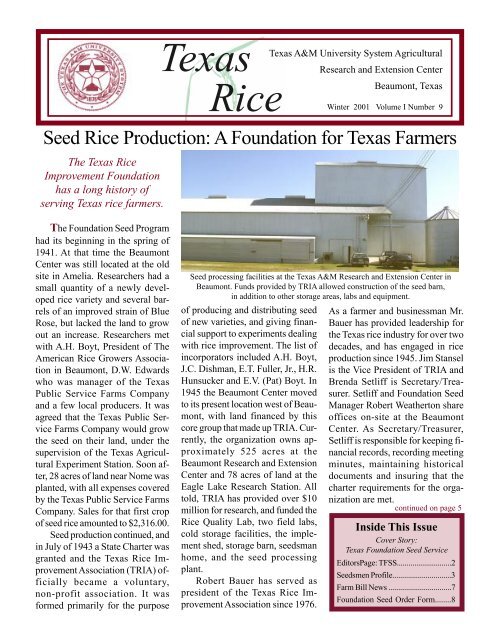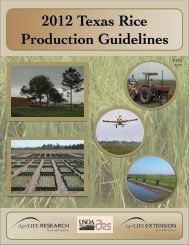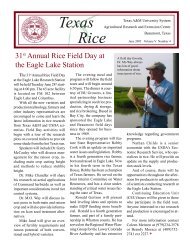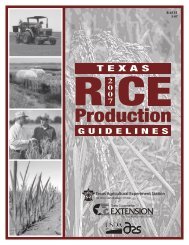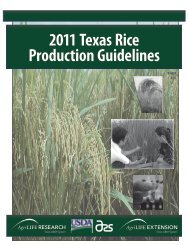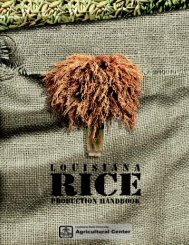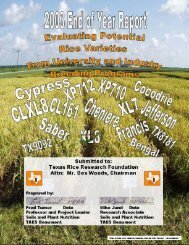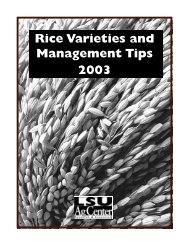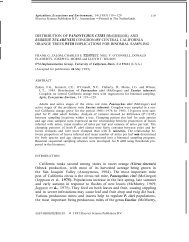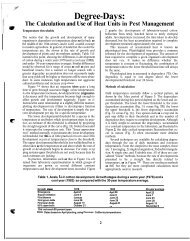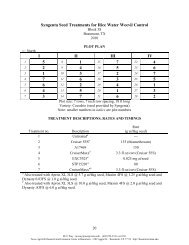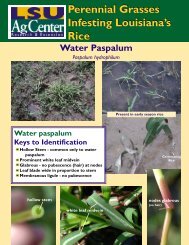Texas Rice - Texas A&M AgriLIFE Research Center at Beaumont ...
Texas Rice - Texas A&M AgriLIFE Research Center at Beaumont ...
Texas Rice - Texas A&M AgriLIFE Research Center at Beaumont ...
You also want an ePaper? Increase the reach of your titles
YUMPU automatically turns print PDFs into web optimized ePapers that Google loves.
The <strong>Texas</strong> <strong>Rice</strong><br />
Improvement Found<strong>at</strong>ion<br />
has a long history of<br />
serving <strong>Texas</strong> rice farmers.<br />
<strong>Texas</strong><br />
<strong>Rice</strong><br />
<strong>Texas</strong> A&M University System Agricultural<br />
<strong>Research</strong> and Extension <strong>Center</strong><br />
<strong>Beaumont</strong>, <strong>Texas</strong><br />
Winter 2001 Volume I Number 9<br />
Seed <strong>Rice</strong> Production: A Found<strong>at</strong>ion for <strong>Texas</strong> Farmers<br />
The Found<strong>at</strong>ion Seed Program<br />
had its beginning in the spring of<br />
1941. At th<strong>at</strong> time the <strong>Beaumont</strong><br />
<strong>Center</strong> was still loc<strong>at</strong>ed <strong>at</strong> the old<br />
site in Amelia. <strong>Research</strong>ers had a<br />
small quantity of a newly developed<br />
rice variety and several barrels<br />
of an improved strain of Blue<br />
Rose, but lacked the land to grow<br />
out an increase. <strong>Research</strong>ers met<br />
with A.H. Boyt, President of The<br />
American <strong>Rice</strong> Growers Associ<strong>at</strong>ion<br />
in <strong>Beaumont</strong>, D.W. Edwards<br />
who was manager of the <strong>Texas</strong><br />
Public Service Farms Company<br />
and a few local producers. It was<br />
agreed th<strong>at</strong> the <strong>Texas</strong> Public Service<br />
Farms Company would grow<br />
the seed on their land, under the<br />
supervision of the <strong>Texas</strong> Agricultural<br />
Experiment St<strong>at</strong>ion. Soon after,<br />
28 acres of land near Nome was<br />
planted, with all expenses covered<br />
by the <strong>Texas</strong> Public Service Farms<br />
Company. Sales for th<strong>at</strong> first crop<br />
of seed rice amounted to $2,316.00.<br />
Seed production continued, and<br />
in July of 1943 a St<strong>at</strong>e Charter was<br />
granted and the <strong>Texas</strong> <strong>Rice</strong> Improvement<br />
Associ<strong>at</strong>ion (TRIA) officially<br />
became a voluntary,<br />
non-profit associ<strong>at</strong>ion. It was<br />
formed primarily for the purpose<br />
Seed processing facilities <strong>at</strong> the <strong>Texas</strong> A&M <strong>Research</strong> and Extension <strong>Center</strong> in<br />
<strong>Beaumont</strong>. Funds provided by TRIA allowed construction of the seed barn,<br />
in addition to other storage areas, labs and equipment.<br />
of producing and distributing seed<br />
of new varieties, and giving financial<br />
support to experiments dealing<br />
with rice improvement. The list of<br />
incorpor<strong>at</strong>ors included A.H. Boyt,<br />
J.C. Dishman, E.T. Fuller, Jr., H.R.<br />
Hunsucker and E.V. (P<strong>at</strong>) Boyt. In<br />
1945 the <strong>Beaumont</strong> <strong>Center</strong> moved<br />
to its present loc<strong>at</strong>ion west of <strong>Beaumont</strong>,<br />
with land financed by this<br />
core group th<strong>at</strong> made up TRIA. Currently,<br />
the organiz<strong>at</strong>ion owns approxim<strong>at</strong>ely<br />
525 acres <strong>at</strong> the<br />
<strong>Beaumont</strong> <strong>Research</strong> and Extension<br />
<strong>Center</strong> and 78 acres of land <strong>at</strong> the<br />
Eagle Lake <strong>Research</strong> St<strong>at</strong>ion. All<br />
told, TRIA has provided over $10<br />
million for research, and funded the<br />
<strong>Rice</strong> Quality Lab, two field labs,<br />
cold storage facilities, the implement<br />
shed, storage barn, seedsman<br />
home, and the seed processing<br />
plant.<br />
Robert Bauer has served as<br />
president of the <strong>Texas</strong> <strong>Rice</strong> Improvement<br />
Associ<strong>at</strong>ion since 1976.<br />
As a farmer and businessman Mr.<br />
Bauer has provided leadership for<br />
the <strong>Texas</strong> rice industry for over two<br />
decades, and has engaged in rice<br />
production since 1945. Jim Stansel<br />
is the Vice President of TRIA and<br />
Brenda Setliff is Secretary/Treasurer.<br />
Setliff and Found<strong>at</strong>ion Seed<br />
Manager Robert We<strong>at</strong>herton share<br />
offices on-site <strong>at</strong> the <strong>Beaumont</strong><br />
<strong>Center</strong>. As Secretary/Treasurer,<br />
Setliff is responsible for keeping financial<br />
records, recording meeting<br />
minutes, maintaining historical<br />
documents and insuring th<strong>at</strong> the<br />
charter requirements for the organiz<strong>at</strong>ion<br />
are met.<br />
continued on page 5<br />
Inside This Issue<br />
Cover Story:<br />
<strong>Texas</strong> Found<strong>at</strong>ion Seed Service<br />
EditorsPage: TFSS............................2<br />
Seedsmen Profile..............................3<br />
Farm Bill News ................................7<br />
Found<strong>at</strong>ion Seed Order Form........8
From<br />
the<br />
Editor...<br />
Welcome to this special issue<br />
of <strong>Texas</strong> <strong>Rice</strong>. We are closing out this<br />
year’s production of <strong>Texas</strong> <strong>Rice</strong> with<br />
an issue dedic<strong>at</strong>ed to the <strong>Texas</strong> rice<br />
found<strong>at</strong>ion seed program. The purpose<br />
of this issue is to provide our<br />
producers with a general overview of how the <strong>Texas</strong><br />
rice found<strong>at</strong>ion seed program evolved and the tremendous<br />
amount of work the staff spendS to deliver superior<br />
rice seed.<br />
For the rest of this editorial, I would like to go a<br />
bit beyond rice and focus on the remaining part of the<br />
<strong>Texas</strong> st<strong>at</strong>ewide Found<strong>at</strong>ion Seed program. While rice<br />
found<strong>at</strong>ion seed is produced by the <strong>Texas</strong> <strong>Rice</strong> Improvement<br />
Associ<strong>at</strong>ion (TRIA), found<strong>at</strong>ion seed for<br />
many other crops is produced by the <strong>Texas</strong> Found<strong>at</strong>ion<br />
Seed Service (TFSS). TFSS oper<strong>at</strong>es as a link in<br />
the seed-increase program between the public plant<br />
breeder and the commercial seedsmen or priv<strong>at</strong>e<br />
breeder to produce seed for a wide range of crops. Similar<br />
to TRIA,TFSS is a nonprofit self-supporting organiz<strong>at</strong>ion.<br />
However, unlike TRIA, TFSS is a unit of the<br />
<strong>Texas</strong> Agricultural Experiment St<strong>at</strong>ion.<br />
TFSS began in 1951, initially producing corn seed.<br />
TFSS now produces more than 100 varieties, strains<br />
and crosses of 25 crops. These crops are listed in the<br />
FSS Price List <strong>at</strong> http://tfss.tamu.edu/. TFSS takes<br />
small amount of seed provided by plant breeders and<br />
multiplies it for distribution to producers. As with rice,<br />
found<strong>at</strong>ion seed for other crops is priced higher than<br />
commercial seed since it is a premier grade and intended<br />
for increase and not commercial production.<br />
Its seed production is primarily through supervised<br />
contracts with growers in selected areas. Seed conditioning<br />
is handled <strong>at</strong> the TFSS facilities or by supplemental<br />
services provided through contractual<br />
arrangements. Found<strong>at</strong>ion seed production must meet<br />
<strong>Texas</strong> Department of Agricultural requirements involving<br />
sanit<strong>at</strong>ion of planting and harvesting equipment,<br />
and specified rot<strong>at</strong>ion conditions.<br />
In August of this year, TFSS under went a major<br />
change in its management, with the hiring of Steve<br />
Brown as TFSS Program Director. Steve gradu<strong>at</strong>ed<br />
from <strong>Texas</strong> Tech with a BS in Business and has worked<br />
in the priv<strong>at</strong>e sector seed industry from 1973-1999. In<br />
2000, Steve went to work for a business lobby group<br />
and commuted to Washington DC from his home in<br />
Vernon, <strong>Texas</strong>. His wife Jan, to whom he has been<br />
married for 30 years, remained in Vernon where she is<br />
2<br />
a teacher. Fortun<strong>at</strong>ely for <strong>Texas</strong>, Steve decided th<strong>at</strong><br />
the Washington DC circuit was not for him and he returned<br />
to <strong>Texas</strong> to work for TFSS.<br />
Steve is well respected by the seed industry, and<br />
has many priv<strong>at</strong>e industry contacts. He has a strong<br />
understanding of the problems th<strong>at</strong> seedsmen face.<br />
Steve has stepped into his new position and is moving<br />
<strong>at</strong> a fast and furious pace. In the brief time th<strong>at</strong> Steve<br />
has been with TFSS, he has upgraded the TFSS website<br />
with help from Loretta Cortez in College St<strong>at</strong>ion, added<br />
more inform<strong>at</strong>ion, and making the website more user<br />
friendly. He has also worked very closely with Frank<br />
Gilstrap in the<br />
TAES administr<strong>at</strong>ive<br />
office, and with<br />
the TAMU Technology<br />
Licensing Office<br />
in redefining<br />
the role of TFSS<br />
with regards to Intellectual<br />
Property<br />
Protection and Li-<br />
Steve Brown is the<strong>Texas</strong> Found<strong>at</strong>ion<br />
Seed Service Program Director.<br />
censing Agreements.<br />
Many of the<br />
changes th<strong>at</strong> Steve<br />
is bringing to TFSS<br />
will undoubtedly be<br />
given serious consider<strong>at</strong>ion by the <strong>Texas</strong> rice found<strong>at</strong>ion<br />
seed program.<br />
If you need found<strong>at</strong>ion seed for other crops, please<br />
contact Steve <strong>at</strong> TFSS. He can be reached <strong>at</strong> <strong>Texas</strong><br />
Found<strong>at</strong>ion Seed Service, 11914 Hwy. 70, Vernon, TX<br />
76384, Phone: (940) 552-6226, Fax: (940) 552-5524.<br />
As a quick sales pitch, I would like to remind all<br />
of our rice seedsmen th<strong>at</strong> if they are in the market for<br />
found<strong>at</strong>ion seed, get your orders in soon. With a couple<br />
of new varieties available this year, found<strong>at</strong>ion seed<br />
supplies are expected to sell quickly. We have provided<br />
a found<strong>at</strong>ion seed order form on the back page<br />
of <strong>Texas</strong> <strong>Rice</strong>. Similarly, producers should get with<br />
their seedsmen as soon as possible. Certified seed for<br />
some varieties is expected to be in low supply this year,<br />
again because of new releases. I hope you find the<br />
cover story and the supporting articles useful.<br />
Sincerely,<br />
Ted Wilson<br />
Professor and <strong>Center</strong> Director
Seedsmen Profile...<br />
<strong>Texas</strong> Growers Producing Quality Seed <strong>Rice</strong><br />
There are many steps involved in the<br />
production of high quality seed rice,<br />
giving our growers every advantage<br />
in a world marketplace.<br />
Seed certific<strong>at</strong>ion in <strong>Texas</strong> is a system designed<br />
to maintain the genetic identity and purity of crop<br />
varieties. The process starts with breeder seed,<br />
which comes directly from the scientist who developed<br />
the variety. This seed is grown out to produce<br />
found<strong>at</strong>ion seed. In the case of rice, this step is carried<br />
out by the <strong>Texas</strong> <strong>Rice</strong> Improvement<br />
Associ<strong>at</strong>ion’s Found<strong>at</strong>ion Seed Program, loc<strong>at</strong>ed <strong>at</strong> the<br />
<strong>Texas</strong> A&M <strong>Research</strong> and Extension <strong>Center</strong> in <strong>Beaumont</strong>.<br />
The seed is handled so as to maintain the genetic<br />
purity and identity as design<strong>at</strong>ed by the Federal<br />
Seed Act and <strong>Texas</strong> Seed Law. These laws are enforced<br />
by the <strong>Texas</strong> Department of Agriculture (TDA). No<br />
more than 4 days prior to harvest, found<strong>at</strong>ion fields<br />
are inspected by TDA represent<strong>at</strong>ives and must meet<br />
strict standards for purity.<br />
Next, seedsmen purchase the found<strong>at</strong>ion seed to<br />
produce registered seed, and the registered seed is then<br />
grown out to produce certified seed. Both of these steps<br />
also require TDA certific<strong>at</strong>ion, and labor<strong>at</strong>ory verific<strong>at</strong>ion<br />
of seed germin<strong>at</strong>ion and purity. The certified<br />
seed is purchased by growers who want the highest<br />
quality seed possible for commercial crop production.<br />
Any grower can produce registered or certified seed<br />
for sale to other growers, but they must meet TDA<br />
guidelines as dict<strong>at</strong>ed by st<strong>at</strong>e law. The following is a<br />
list of seedsmen in <strong>Texas</strong> who grow registered or certified<br />
seed.<br />
Winco Ag Products – Eagle Lake - Winco is a<br />
subsidiary of Wintermann and Co., which was founded<br />
by the l<strong>at</strong>e David Wintermann. The Wintermann family<br />
has a long history of rice production in <strong>Texas</strong>. David<br />
was one of the first growers to produce registered seed<br />
rice back in the early 1940’s. Currently, Davis Waddell<br />
is the Winco farm manager, and coordin<strong>at</strong>es the production<br />
of registered and certified seed. Tennant farmers<br />
produce the seed on approxim<strong>at</strong>ely 6000 acres of<br />
Wintermann land th<strong>at</strong> has been in the family for over<br />
60 years. Last year they grew Cocodrie, Cypress,<br />
Jefferson and Saber. Waddell and Cliff Mock scout<br />
A field of registered seed rice.The roguing lanes insure th<strong>at</strong><br />
workers have clear access to remove any unwanted plants.<br />
the fields regularly for insects, disease problems and<br />
nutrient deficiencies. Call 979-234-5551 for more inform<strong>at</strong>ion.<br />
Glenn Toler Farms – Raywood – Clodus Cox<br />
started as Farm Manager for the <strong>Beaumont</strong> <strong>Center</strong> in<br />
1953. In 1958 he went to Seaburg <strong>Rice</strong> Company and<br />
within 10 years was producing 3600 acres of registered<br />
and certified rice. Today Cox manages his sonin-law’s<br />
oper<strong>at</strong>ion, where they produce commercial<br />
and seed rice. Last year they grew 66 acres of registered<br />
Saber, the newest release from the <strong>Beaumont</strong><br />
<strong>Center</strong>. For more inform<strong>at</strong>ion call 281-391-2118.<br />
BU Growers – Bay City – BU is a limited partnership<br />
cre<strong>at</strong>ed in the spring of 1989. Joe Crane is a<br />
general partner and manager, with Lee Bosley serving<br />
as assistant general manager and sales agent. Services<br />
offered include commercial drying and marketing<br />
through their sales office. BU grows only seed rice<br />
and contracts with 5 growers in the Wharton/Bay City<br />
area to produce 1500 acres of registered and certified<br />
rice annually. Last year they grew Jefferson, Gulfmont,<br />
Cypress, Cocodrie, Dixiebelle Saber and Clearfield<br />
varieties. For more inform<strong>at</strong>ion call 979-245-2043.<br />
J. D. Woods Interests – Brookshire – Des Woods<br />
is well known for his work in the rice industry, and<br />
has produced seed rice since 1975. He has acreage in<br />
<strong>Texas</strong> and Louisiana, and produces commercial rice<br />
as well as registered and certified seed rice. Last year<br />
he grew registered Cocodrie and Cypress for sale to<br />
<strong>Texas</strong> and Louisiana producers. Des currently serves<br />
as Chairman of the <strong>Texas</strong> <strong>Rice</strong> <strong>Research</strong> Found<strong>at</strong>ion.<br />
Call 281-375-5562 for more inform<strong>at</strong>ion.<br />
continued on next page<br />
3
Seedsmen continued...<br />
Garrett Farms – Danbury – Jacko and Nancy<br />
Garrett have produced certified and registered seed<br />
rice since 1983. Last year they grew 1800 acres<br />
for seed - including Saber, Jefferson, Cocodrie, Cypress,<br />
Lemont, CL121, CL141, and CL161. The<br />
Garrett’s also grow commercial rice, and were responsible<br />
for starting Share the Harvest, a charitable<br />
non-profit found<strong>at</strong>ion th<strong>at</strong> collects rice<br />
don<strong>at</strong>ions from farmers, coordin<strong>at</strong>es drying and<br />
milling, and distributes the food to area food banks<br />
and relief efforts. For more inform<strong>at</strong>ion call 979-922-<br />
8405 or email jgarrett@garrettfarms.com<br />
<strong>Rice</strong> Belt Warehouse – El Campo – Cre<strong>at</strong>ed in<br />
1962, <strong>Rice</strong> Belt currently has s<strong>at</strong>ellite facilities in Edna,<br />
Ganado, Blessing, Bay City, Rosharon and Alvin. Dick<br />
Ottis is the Executive Vice President and CEO and<br />
Jim Pavlik is the seed rice Production Manager, who<br />
is responsible for the daily oper<strong>at</strong>ions of the seed business.<br />
Services include drying, storage, marketing assistance,<br />
custom seed processing and registered &<br />
certified seed<br />
Hundreds of man-hours are spent insuring<br />
the purity of <strong>Texas</strong> seed rice.<br />
sales. Last<br />
year they<br />
teamed up<br />
with Jay<br />
Davis <strong>at</strong> East<br />
Bernard Marketing<br />
Co-op<br />
to provide<br />
web-based<br />
marketing opportunities<br />
for<br />
their growers.<br />
<strong>Rice</strong> Belt contracts<br />
with 7 growers who produce seed rice on a total<br />
of 1500 acres in M<strong>at</strong>agorda, Jackson, Victoria,<br />
Wharton and Colorado Counties. In 2001 they grew<br />
Cypress, Lemont, Gulfmont, Cocodrie, Jefferson and<br />
Wells. For more inform<strong>at</strong>ion call 979-543-6221 or log<br />
on to www.ricebelt.com<br />
Franz Seed <strong>Rice</strong> – K<strong>at</strong>y – Raymond Franz has<br />
been producing registered seed rice since Lemont was<br />
released in 1983, and has been on the TRIA board for<br />
over 30 years. Last year he grew registered Jefferson,<br />
Cocodrie, Saber and Dixiebelle on a total of 425 acres.<br />
He also has approxim<strong>at</strong>ely 400 acres in commercial<br />
production. Raymond has kept his seed rice business<br />
Roguing crews carry bags to guarantee all off-types are completely<br />
removed from registered and certified fields.<br />
4<br />
small to insure quality, selling mostly to farmers in<br />
the K<strong>at</strong>y area. He relies on Gary Bradshaw for consulting<br />
on his seed rice and commercial acreage. To<br />
contact Raymond call 281-391-8152.<br />
Murrell Farms – Winnie – David Murrell has been<br />
in seed rice production for over 20 years, growing<br />
mostly new releases. This year he grew 15 acres of<br />
registered Saber for his personal use, and for sale to<br />
neighbors. He has approxim<strong>at</strong>ely 700 acres in commercial<br />
production in the Winnie area. David’s brother<br />
Edward owns Winnie Dryers, a company th<strong>at</strong> specializes<br />
in the construction and maintenance of rice dryers.<br />
David’s uncle, Raymond Murrell, farms rice in<br />
Mississippi and David occasionally sends seed there<br />
to be grown out, as the soil type more favorable for<br />
seed rice production. For more inform<strong>at</strong>ion call David<br />
<strong>at</strong> 409-296-9598.<br />
*<br />
Article by Jay Cockrell.<br />
Photos courtesy of <strong>Rice</strong> Belt Warehouse.<br />
OOPS !!!<br />
In the October issue of <strong>Texas</strong> <strong>Rice</strong> we incorrectly<br />
cited the photographer of the ‘crop form<strong>at</strong>ion’ taken<br />
<strong>at</strong> Hlavinka Farm as Garry McCauley. Roland<br />
Orsak took the photograph and Garry did us the<br />
service of passing it along!<br />
Happy Holidays to all our farmers<br />
and friends! We hope the coming<br />
season will be even more productive<br />
than the last. Thanks to everyone<br />
for helping make our first year of<br />
<strong>Texas</strong> <strong>Rice</strong> a success!
Found<strong>at</strong>ion Seed continued...<br />
Brenda Setliff is the TRIA Secretary/Treasurer.<br />
She handles the office end of running the<br />
found<strong>at</strong>ion seed rice program.<br />
5<br />
Found<strong>at</strong>ion Seed Manager Robert We<strong>at</strong>herton<br />
demonstr<strong>at</strong>ing the air-activ<strong>at</strong>ed bagging scale<br />
used to package seed rice. The scale is inspected<br />
yearly by the TDA to insure accuracy.<br />
Robert We<strong>at</strong>herton has been<br />
the Found<strong>at</strong>ion Seed Manager for<br />
TRIA since 1996. His duties span<br />
the gamut from tractor work to supervising<br />
employees in the care<br />
and upkeep of found<strong>at</strong>ion fields.<br />
Each year, approxim<strong>at</strong>ely 150<br />
acres <strong>at</strong> the <strong>Center</strong> are dedic<strong>at</strong>ed<br />
to found<strong>at</strong>ion seed production.<br />
And while the planting scheme<br />
has varied over the years,<br />
We<strong>at</strong>herton currently practices a<br />
3-year rot<strong>at</strong>ion, as required by<br />
st<strong>at</strong>e law. This insures th<strong>at</strong> fields<br />
are kept clean, especially from red<br />
rice, and the found<strong>at</strong>ion seed produced<br />
is of the highest possible<br />
quality.<br />
Found<strong>at</strong>ion fields are planted<br />
between March 15 th and April 15 th .<br />
The seeding r<strong>at</strong>e is 50 to 80 lbs/ac depending on the<br />
variety. Seed is tre<strong>at</strong>ed with Icon (for rice w<strong>at</strong>er weevils),<br />
Release (growth hormone), Vitavax (warm season<br />
fungicide), Allegence (cool season fungicide) and<br />
zinc (seedling vigor and development.) For the base<br />
fertilizer, 200 lbs/ac of diammonium phosph<strong>at</strong>e (18-<br />
46-0) is incorpor<strong>at</strong>ed two days prior to planting. Soil<br />
tests are sent in every other year, and if a need is indic<strong>at</strong>ed,<br />
special fertilizer blends are applied. After planting,<br />
the fields are rolled and the<br />
herbicide Command is applied<br />
for grass control. The fields are<br />
then flushed and drained. If<br />
needed, a 33-0-0 urea and ammonium<br />
sulf<strong>at</strong>e blend is applied<br />
during flushing after the threeleaf<br />
stage. While this source is<br />
more expensive, We<strong>at</strong>herton<br />
feels th<strong>at</strong> the nitrogen stays in<br />
the tissues longer, cre<strong>at</strong>ing<br />
healthier plants.<br />
At the 5-leaf stage a foliar<br />
applic<strong>at</strong>ion of Gibberellic acid<br />
tank mixed with an herbicide<br />
may be applied to boost growth<br />
and reduce weed popul<strong>at</strong>ions.<br />
The day before permanent flood<br />
urea is applied <strong>at</strong> a r<strong>at</strong>e of 100 –<br />
200 lbs/ac, depending on the variety<br />
and stand count. Permanent flood is established<br />
roughly 30 days after seedling emergence. The fields<br />
are thoroughly rogued for off-types throughout the<br />
growing season, beginning <strong>at</strong> PD. The last urea applic<strong>at</strong>ions<br />
are made <strong>at</strong> panicle initi<strong>at</strong>ion (PI), 100 lbs/ac,<br />
<strong>at</strong> panicle differenti<strong>at</strong>ion (PD), 50 - 75 lbs/ac, and 10<br />
days after PD, 50 – 75 lbs/ac.<br />
Pest popul<strong>at</strong>ions are closely monitored, with stinkbugs<br />
being the main thre<strong>at</strong>. The fields are w<strong>at</strong>ched<br />
closely from first flowering through the milk stages<br />
and Kar<strong>at</strong>e is applied <strong>at</strong> a r<strong>at</strong>e of 4 oz/ac every 15 days<br />
if needed. There was a new product introduced for rice<br />
in October of 2001 called Fury. It is similar to Kar<strong>at</strong>e,<br />
and labeled for the same pests. We<strong>at</strong>herton is considering<br />
rot<strong>at</strong>ing the two, to avoid build up of resistant<br />
pest popul<strong>at</strong>ions. Fungicide is applied as a precautionary<br />
measure 7 – 10 days after PD.<br />
The <strong>Texas</strong> Department of Agriculture inspects the<br />
fields no more than 4 days prior to harvest, looking<br />
for off-types and red rice infest<strong>at</strong>ion. In addition to<br />
this, a 10 lb bulk sample must be sent to the TDA lab<br />
in Giddings for further evalu<strong>at</strong>ion before the seed is<br />
approved. Harvest begins in July, and anything harvested<br />
before August 15 th may be r<strong>at</strong>ooned, although<br />
this rice is not sold as seed. The grain is dried and<br />
stored <strong>at</strong> the <strong>Center</strong>, with extreme care taken to maincontinued<br />
on next page
Found<strong>at</strong>ion Seed continued...<br />
tain the purity of the seed rice. The combines are thoroughly<br />
disassembled and cleaned after each variety is<br />
harvested, removing the header and all the screens, to<br />
insure th<strong>at</strong> cross contamin<strong>at</strong>ion does not occur.<br />
In the 2001 crop year Saber, Jefferson, Bolivar,<br />
Lemont and Della were produced by the found<strong>at</strong>ion<br />
seed program. A commercial field of Dixiebelle was<br />
also produced. The TRIA board will meet in January<br />
to decide which varieties will be grown in 2002, but<br />
indic<strong>at</strong>ions are the list will include<br />
Saber, Bolivar, Jasmine 85, Cypress<br />
and Cocodrie.<br />
The deadline for placing<br />
found<strong>at</strong>ion seed orders is January<br />
18 th . If the pre-deadline orders for<br />
a variety exceed the supply available,<br />
then the seed will be alloc<strong>at</strong>ed<br />
by the TRIA board. After<br />
the January 18 th deadline, remaining<br />
seed is distributed on a first<br />
come, first served basis. It is to<br />
the grower’s advantage to order<br />
Kip Landry first started <strong>at</strong> the <strong>Beaumont</strong><br />
<strong>Center</strong> in 1994, and has worked in the<br />
Found<strong>at</strong>ion Seed Program for the past two<br />
years. Not pictured is Louis Perez, who has<br />
worked in the program since the fall of 2000.<br />
6<br />
early, to insure they will get wh<strong>at</strong><br />
they need for th<strong>at</strong> crop year. Only<br />
those producers who particip<strong>at</strong>e<br />
in the rice check-off program are<br />
eligible to purchase found<strong>at</strong>ion<br />
seed.<br />
The check-off program was initi<strong>at</strong>ed in 1982 as<br />
authorized by st<strong>at</strong>e law, and the monies are collected<br />
by the <strong>Texas</strong> <strong>Rice</strong> Producers Board (TRPB). Each year,<br />
farmers contribute 8¢ per every hundredweight of rice<br />
sold, with 5¢ directed towards research and 3¢ for marketing.<br />
The TRPB collects the check-off fund and distributes<br />
the money earmarked for marketing to the<br />
<strong>Texas</strong> <strong>Rice</strong> Council and the research funds to the <strong>Texas</strong><br />
<strong>Rice</strong> <strong>Research</strong> Found<strong>at</strong>ion (TRRF), who then awards<br />
the money to researchers through a competitive grant<br />
program. TRRF is also a voluntary non-profit organiz<strong>at</strong>ion,<br />
solely comprised of farmers. The Chairman of<br />
TRRF is Des Woods, Vice-Chairman is Layton Raun,<br />
and the secretary is Rodney Mowery. Alice Garlough<br />
is a registered CPA and acts as Administr<strong>at</strong>ive Services<br />
Manager for the organiz<strong>at</strong>ion. Her office is loc<strong>at</strong>ed<br />
on their family ranch just outside of Sealy in C<strong>at</strong><br />
Spring. She works for TRRF on a contract basis, and<br />
handles all the bookkeeping associ<strong>at</strong>ed with the collection<br />
and distribution of check-off funds. At the end<br />
of the year, farmers have the option of requesting a<br />
refund, or leaving their check-off monies in place to<br />
be distributed by TRRF. The call for proposals goes<br />
out in the Fall, and each December researchers can<br />
submit grant proposals dealing with rice production<br />
and improvement. The review process goes through<br />
February, <strong>at</strong> which time the TRRF Board of Directors<br />
announces which proposals have been awarded funding.<br />
Last year the <strong>Texas</strong> <strong>Rice</strong> <strong>Research</strong><br />
Found<strong>at</strong>ion funded<br />
$600,886 in grant and equipment<br />
money, all of which came from producer<br />
check-off funds. Since its<br />
conception in 1982, the TRRF<br />
board has distributed over $15 million<br />
for rice research in <strong>Texas</strong>.<br />
Projects funded last year include<br />
Biology and Management of<br />
Stem Borers in the <strong>Texas</strong> <strong>Rice</strong> Belt;<br />
Determining the Physical, Chemical<br />
and Genetic Mechanisms of<br />
Fissure Resistance; Development<br />
of Improved Breeding Methods<br />
and <strong>Rice</strong> Cultivars for <strong>Texas</strong>; Farm<br />
Level Analysis for the Evalu<strong>at</strong>ion<br />
of Farm Policy Options; Funding<br />
of 2002 <strong>Rice</strong> Production Guidelines<br />
and <strong>Rice</strong> Upd<strong>at</strong>e Newsletter; Integr<strong>at</strong>ed Weed<br />
Management System for Herbicide Tolerant <strong>Rice</strong>;<br />
Physiology <strong>Research</strong> to Improve Combined First and<br />
Second Crop Yield; The Physiological Basis for Superior<br />
Yield Performance in <strong>Texas</strong> <strong>Rice</strong>; A Rapid<br />
Method for Determining Carbohydr<strong>at</strong>es and Nitrogen<br />
<strong>at</strong> Different Stages of <strong>Rice</strong> Development; <strong>Rice</strong> Growth,<br />
Development, and Yield Educ<strong>at</strong>ional Series and Survey<br />
for Current <strong>Texas</strong> <strong>Rice</strong> Crop St<strong>at</strong>istics; and Stem<br />
Carbohydr<strong>at</strong>es <strong>Research</strong> to Expand R<strong>at</strong>oon Crop Acreage<br />
and Income.<br />
In spite of the reduction in <strong>Texas</strong> rice acreage over<br />
the past 10 years, the industry continues to contribute<br />
a significant amount to the st<strong>at</strong>e’s economy. Now more<br />
than ever before, it is important for producers and researchers<br />
to strengthen alliances, and reaffirm commitments<br />
th<strong>at</strong> will carry the rice industry forward into<br />
the 21 st century.<br />
*<br />
Article and photos by Jay Cockrell.
Sen<strong>at</strong>e Fails To Pass Farm Bill Before End of Session<br />
USA RICE FEDERATION - The<br />
United St<strong>at</strong>es Sen<strong>at</strong>e was unable to<br />
produce a farm bill this week when<br />
bipartisan consensus did not develop<br />
around any of three major<br />
bills under consider<strong>at</strong>ion. USA <strong>Rice</strong><br />
worked hard with our rice-st<strong>at</strong>e<br />
Sen<strong>at</strong>ors to try to develop consensus<br />
sufficient to pass a bill.<br />
“The rice industry, in particular,<br />
has been faced with hard times,<br />
low prices and a very large crop.<br />
Our priority has been to work with<br />
rice-st<strong>at</strong>e Sen<strong>at</strong>ors to fashion a bill<br />
th<strong>at</strong> would provide a sufficient<br />
safety net for farmers and a solid<br />
commodity title,” said Ellen<br />
Terpstra, USA <strong>Rice</strong> Feder<strong>at</strong>ion<br />
president. “We urged Congress to<br />
complete action on the bill as soon<br />
as possible so th<strong>at</strong> rice producers<br />
would be in a better position early<br />
next year as they have to make<br />
planting decisions. We appreci<strong>at</strong>e<br />
the leadership shown by the ricest<strong>at</strong>e<br />
sen<strong>at</strong>ors we worked with, but<br />
are extremely disappointed th<strong>at</strong> the<br />
Sen<strong>at</strong>e was not able to gain bipartisan<br />
support for a farm bill this session.<br />
We urge rice producers and<br />
millers to join us between now and<br />
when Congress reconvenes in l<strong>at</strong>e<br />
January to press for action on the<br />
bill early next year.”<br />
During the Sen<strong>at</strong>e deb<strong>at</strong>e this<br />
week, the Cochran-Roberts and the<br />
Hutchinson substitutes were both<br />
voted down. The Sen<strong>at</strong>e held three<br />
cloture votes on the Daschle substitute,<br />
none of which was successful.<br />
Cloture would have limited<br />
deb<strong>at</strong>e to 30 hours with only germane<br />
amendments offered. It takes<br />
60 votes to invoke cloture, but the<br />
committee-passed bill could only<br />
muster 54. Sen<strong>at</strong>e Majority Leader<br />
Tom Daschle (D-S.D.) warned th<strong>at</strong><br />
if cloture was not invoked on the<br />
third vote he would pull the bill<br />
from the floor and move to other<br />
important business. Daschle was<br />
true to his word and pulled the farm<br />
bill from consider<strong>at</strong>ion.<br />
Republicans expressed concern<br />
th<strong>at</strong> if cloture were invoked there<br />
would not be time for all the amendments<br />
to be offered. Democr<strong>at</strong>s<br />
countered th<strong>at</strong> the failed Republican<br />
substitutes have given the Republicans<br />
opportunity to change the<br />
committee bill and th<strong>at</strong> cloture<br />
would still provide for 30 hours of<br />
deb<strong>at</strong>e. The farm bill was but one<br />
item on the list of issues th<strong>at</strong> the<br />
Sen<strong>at</strong>e could not agree upon during<br />
the last week of work before the<br />
year-end break. The halt to the farm<br />
bill deb<strong>at</strong>e on December 19 came<br />
after negoti<strong>at</strong>ions on the economic<br />
stimulus package broke down.<br />
Following a meeting on December<br />
20, the White House issued<br />
a letter to Republican lawmakers on<br />
the importance of producing a<br />
good, bipartisan farm bill th<strong>at</strong> the<br />
president can sign into law early<br />
next year. The letter st<strong>at</strong>ed th<strong>at</strong>,<br />
“The President also has been clear<br />
about the need for a generous farm<br />
bill in order to help farmers and<br />
ranchers through this difficult period.<br />
As a result, you have our commitment<br />
th<strong>at</strong> the Administr<strong>at</strong>ion<br />
will continue to support additional<br />
ten-year program funding of $73.5<br />
billion in accordance with the Congressional<br />
Budget Resolution.”<br />
The farm bill deb<strong>at</strong>e is over for<br />
2001. USA <strong>Rice</strong> is hopeful th<strong>at</strong> in<br />
January a rested and revived United<br />
St<strong>at</strong>es Sen<strong>at</strong>e will pick up where<br />
they left off and make rice producer<br />
and miller expect<strong>at</strong>ions of meaningful<br />
new farm policy a reality.<br />
7<br />
Farm Security Act of 2001<br />
House Version of the Farm Bill<br />
H.R. 2646 is a product of more<br />
than two years work by the House<br />
Agriculture Committee, which included<br />
numerous field hearings<br />
across the country where real farmers<br />
and ranchers shared their perspectives<br />
on wh<strong>at</strong> was and was not<br />
working with current farm policy.<br />
Over the past four years Congress<br />
has provided over $30 billion<br />
in needed ad hoc assistance for<br />
farmers. H.R. 2646 is a better way<br />
to address the needs of rural<br />
America th<strong>at</strong> will allow more disciplined<br />
budgeting by the federal<br />
government and more reliable assistance<br />
for farmers and ranchers.<br />
H.R. 2646 is a balanced bill th<strong>at</strong><br />
addresses critical farm program<br />
needs and also makes significant<br />
investments in and improvements<br />
to our conserv<strong>at</strong>ion, rural development,<br />
export promotion, research,<br />
nutrition and other programs.<br />
H.R. 2646 maintains planting<br />
flexibility provisions of the current<br />
farm bill and adds a target-price<br />
based counter-cyclical program to<br />
help farmers we<strong>at</strong>her adverse market<br />
conditions.<br />
The Farm Security Act provides<br />
a 3-piece safety net, retaining the<br />
fixed decoupled payments as well<br />
as the marketing loan program, and<br />
adding a counter cyclical payment<br />
to provide consistent and reliable<br />
support th<strong>at</strong> will allow farmers and<br />
their lenders to plan for the future.<br />
H.R. 2646 is fully compliant<br />
with the budget approved out by<br />
Congress earlier this year, providing<br />
$73.5 billion in additional<br />
spending over 10 years.<br />
*
Standard Tre<strong>at</strong>ed<br />
Seed Includes: Vitavax, Zinc,<br />
Release and Apron<br />
Icon applied @ 0.0375 lb.<br />
ai per 60 lb. seeding r<strong>at</strong>e.<br />
MAIL SEED ORDER TO:<br />
<strong>Texas</strong> <strong>Rice</strong> Improvement<br />
Associ<strong>at</strong>ion<br />
1509 Aggie Dr.<br />
<strong>Beaumont</strong>, TX 77713<br />
Attn: Brenda<br />
RICE<br />
VARIETY<br />
PRICE/CWT<br />
STD. TRT.<br />
&NON TRT.<br />
SEED<br />
PRICE/CWT<br />
STD. TRT.<br />
W/ICON<br />
ORDER<br />
CWT.<br />
AMOUNT<br />
ENCLOSED<br />
SABER $80 $20<br />
DIXIEBELLE $60 $20<br />
GULFMONT $60 $20<br />
JASMINE $60 $20<br />
JEFFERSON $60 $20<br />
LEMONT $60 $20<br />
DELLA $80 $20<br />
COCODRIE $60 $20<br />
CYPRESS $60 $20<br />
TOTAL ENCLOSED $ ___________<br />
Full Payment Must Accompany Seed Order. Make checks payable to: <strong>Texas</strong> <strong>Rice</strong> Improvement Associ<strong>at</strong>ion.<br />
All orders must be postmarked by 12:00 noon, January 18, 2002.<br />
Alloc<strong>at</strong>ions will be made Feb. 23, 2002. If you have any questions call 409-752-2741 ext. 2230<br />
Professor and <strong>Center</strong> Director: L.T. (Ted) Wilson<br />
lt-wilson@aesrg.tamu.edu<br />
Ag Communic<strong>at</strong>ions Specialist: Jay Cockrell<br />
j-cockrell@aesrg.tamu.edu<br />
<strong>Texas</strong> A&M University System Agricultural<br />
<strong>Research</strong> and Extension <strong>Center</strong><br />
1509 Aggie Drive, <strong>Beaumont</strong>, TX 77713<br />
(409)752-2741<br />
Access back issues of <strong>Texas</strong> <strong>Rice</strong> <strong>at</strong><br />
http://aesrg.tamu.edu<br />
<strong>Texas</strong> <strong>Rice</strong> is published 9 times a year by The <strong>Texas</strong><br />
A&M University System <strong>Research</strong> and Extension<br />
<strong>Center</strong> <strong>at</strong> <strong>Beaumont</strong>. Interviews, writing and layout<br />
by Jay Cockrell. Editing by Ted Wilson, Jay<br />
Cockrell and Tammy Tindel. Technical support by<br />
Jim Medley. Inform<strong>at</strong>ion is taken from sources believed<br />
to be reliable, but we cannot guarantee accuracy<br />
or completeness. Suggestions, story ideas<br />
and comments are encouraged.<br />
<strong>Texas</strong> A&M University System<br />
Agricultural <strong>Research</strong> and Extension <strong>Center</strong><br />
1509 Aggie Dr.<br />
<strong>Beaumont</strong>, TX 77713<br />
NONPROFIT<br />
ORG.<br />
U.S. POSTAGE<br />
PAID<br />
BEAUMONT, TX<br />
PERMIT NO. 367


